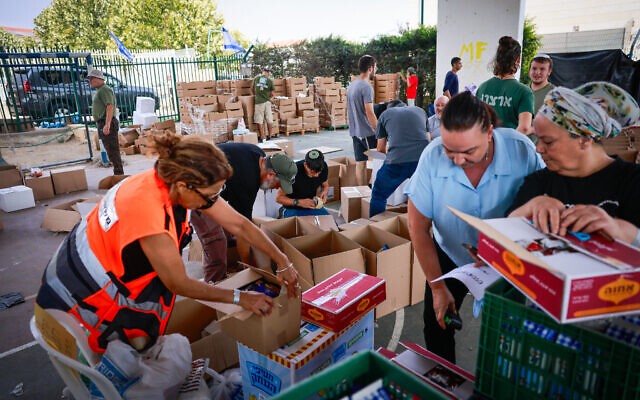Source: The Times of Israel
United in Sorrow, United in Response; Community Resilience in the Face of Conflict
By Randy Pinsky
In times of crisis, sometimes the only thing keeping you going is to mobilize for others.
While Israel was still reeling from Hamas’ murderous rampage to kibbutzes along the Gaza border, communities galvanized to support those who had lost everything. “The community is always very proactive in times of calamity,” observed Professor Csaba Nikolenyi, Director of the Azrieli Institute, in his introduction of stories of activism in “Israeli Civil Society at a Time of War” hosted online on October 17. Speakers included Dr. Paula Kabalo, director of Ben Gurion University's Research Institute for the Study of Israel and Zionism and specialist on civil society leverage; Yariv Wegrzyn, coordinator for Brothers and Sisters for Israel; and Elichai Feldman of Ach Gadol (Big Brother).
Immediately following the attacks on October 7, the entire state of Israel went into action. Those not at the military frontlines lent their support to traumatized families, bringing groceries, clothes and other supplies, reinforcing the message that no one is alone. Communities collected donations, checked in on injured relatives and friends, and hosted reservists streaming in from around the world.
“Civil society action- that’s what we do when things get bad,” commented Kabalo.
Wegrzyn explained how Brothers and Sisters - the largest civilian aid organization in Israel partnered with the military - has leveraged the power of social media for collective action coordination and volunteer engagement. Families and individuals can post their needs and be matched with providers, limiting redundancy and more efficiently distributing goods.
Feldman shared his experiences with the Ach Gadol (‘Big Brother’) lone soldier program. Normally providing mentors for new soldiers and host families for holidays and Shabbat, the organization is maximizing its resources to help reservists, many newly arrived.
“We are healing together as a nation- we are one.”
Taking action and helping others is critical for dealing with the trauma and trying to rebuild. Israelis are known for their resilience and moving quickly from grief to action. Indeed, Kabalo asserted, “Israelis want and have to be involved. [It] gives a sense of purpose, and a way to deal with the pain.”
Foremost among the civil society groups first on the scene was the coordinating team behind Shomrim al Habayit HaMeshutaf (‘Safeguarding Our Common Home’); the movement that coordinated weekly protests against the government's judicial reforms for the past 10 months. Leader and scholar Effie Shoham, shared his views with The Times of Israel’s “Identity/Crisis” podcast (Shalom Hartman Institute) in “Resilience and Ingenuity in Crisis,” hosted by Yehuda Kurtzer.
“With the veil of mourning that still hangs over people,” sometimes the best thing to do is to take action, stated Kurtzer. “There's so much trauma and fear and confusion right now and a kind of manic energy” - the energy and compulsion to do something in whatever capacity possible.
The recent turn of events led to the group pivoting their mission to respond to the staggering needs of the newly vulnerable and recently arrived reservists, under the name the Jerusalem Civil Command Center. “The protests were put on hold and the powerful organizing system was instantly deployed to its country’s most urgent needs” commented Kurtzer. Those who had previously been divided along political lines, came together as one.
Shoham tried to explain the scope of the crisis. “128 yishuvs (communities) were evacuated. That’s huge. A third of the[ir residents] had either been killed, injured or abducted.” Aside from the level of devastation, the loss and target of civilian life was unprecedented. “These past 10 days have been a challenge. I cannot remember a worse time in my life.”
With three of his five sons at the frontlines, the need to focus and strategize helps him make sense of all that is going on. “I cannot sit idle, it’s not in my nature.”
And it’s not just community organizations. Many restaurants have started mass-producing meals and fast tracking kosher certification to have a wider distribution range. Universities are providing support for soldiers, particularly reservists who have been called to duty, offices offering floors for their lodging. Shopping centers have become collection points for donations, coordinating and arranging drop-offs and pick-ups. Many community members have become host families, others providing services for children, even filling in the daily jobs reservists had to temporarily abandon.
Shoham corrected the common use of the term ‘evacuees’ for those affected with the more accurate description of ‘refugees’; indeed, “they are refugees in their own country.”
He concluded with a sentiment shared by many, struggling to just manage the day to day: “The most pressing need is to get the Israeli society to the point where it can stand strong and tall again”- and it will.
Here are the links for supporting Ach Gadol (Big Brother) and Brothers and Sisters Israel.



